This shooting head setup for coastal fishing is both inexpensive, easy to make yourself and very easy to cast.
A couple of months ago, I was fishing with a friend for seatrout on the coast in Denmark. It was a nice day with lots of sun and a nice breeze blowing almost directly into our faces. My friend was having some serious problems getting his fly out over the area where the seatrout would be hunting. He was taking about ten false cast and then shooting some line, but always coming up just a bit short of his target. I counted one time where he made 13 (thirteen!) false cast to try and get his line out. I on the other hand had a great day fishing, two false casts and shoot enough line to reach the target area. After landing a nice seatrout my frustrated friend made a comment about his casting ability, and wanted to know what he is doing wrong, I simply responded, what you needs is "Henning's Setup"
Henning is a good friend,
who has over the years been a big help to myself and many other seatrout anglers on the coast of Denmark, with his generosity of knowledge with running lines, knots, weight and lengths, for using shooting heads on the danish coast, even going so far as borrowing out his equipment for a day or two of fishing to get the general feel for shooting heads.
OK, first lets get
a few things on the record, to try and avoid any hassle from people saying "hey wait a minute, I've been doing that for years, and I've never even met Henning" or that this setup is the reinvention of the wheel. It's just the setup the Henning uses, and him convincing us that this setup will make covering lots of water easier, and will require less effort, because that is what seatrout fishing on the coast is about.
I met Henning
during the first GFF summit that Martin organized in 2006, and I, like many at this summit were beginners in the world of coastal flyfishing for seatrout. I was somewhat in awe of Martin, Henning and many of the other danish fishermen, who have been fishing and catching seatrout for many years. But more than anything, I was amazed at their ability of them to cast effectively, effortlessly, and with distance, despite strong winds, with a what I considered at the time a light rod.
I had always fished
a weight forward line, and was happy with my casting ability, although it would take me 5 or 6 false cast to get my fly in the water, a lot of time casting, less time fishing, is how I like to put it. Coastal flyfishing is about covering lots of water, and I wasn't doing it as much as I could have.
A few years later
myself and friend Kai Nolting met with the GFF crew for a week of fishing on the island of Fyn. Kai like myself was a man who believed his WF line is the way to fish, and it took Henning, Martin, and the other guys on the trip the whole week to convince us that a shooting head is the way of the future. Henning let me use his reel that was setup, and I fished for two days, the first couple of hours I wasn't convinced, as I was having lots of trouble getting the feel of the whole concept. I was still making way to many false cast, and the shooting head was to far out of the tip. But eventually I got the feel, and was amazed how much easier the fishing was becoming. Less effort, greater distance, basically fishing more and less casting.
As I said
I was new to shooting heads, as have been many others on our annual fishing trips. But Henning has over the years turned us into shooting head fishermen, with his persistence that our fishing will become much easier, and more successful by using a shooting heads. Being new to the idea, with no knowledge, or equipment to start, Henning took the time, and though his generosity, provided us with the start up knowledge, and many times startup setups.
His setup consists
of nothing that hasn't been done before, it's an Amnisia monofilament running line of 20 or 25 lbs, attached to a self made shooting head from an DT line, two weight classes higher than the rod weight, cut somewhere between 9 and 10 meters, leader and fly.
That simple.
Now I am fishing more than casting. One or two false cast and my fly is in the water where it belongs. And with a nice breeze from behind, or a cross wind, even I can shoot line a long way! Even wind in your face won't ruin your day, just shorten up your cast a bit, no problem.
I would like to say
it once more to avoid misunderstanding, it's not so much about the setup itself, because there are all kinds of running lines and factory made shooting heads. It's more of the idea, and the way he has convinced us to change thinking, and of course with his supply of running lines and shooting heads, that he is so generous with.
My father would always
harp on us boys when we were growing up, and learning to fish "Boys you can only catch fish if your lure is in the water". The same goes for your fly.
P.S.
One of the things that I didn't mention in the article, is costs. My last shooting heads that I put together were from a mill end DT8 intermediate line, that I purchased though eBay for less than 10 Euros or 14 USD. It was 33 meters or about 100' long and I made 3 shooting heads from this line (2 with front tapers, one level), along with a roll of Amnesia running line, which is about 5 Euros or some 3.5 USD I have a complete setup for less than 10 Euros or the equivalent of 13-14 dollars.
I was in the fly shop the other day and had a look at the newest hi-tec, super taper, half intermediate half floating, blah blah blah... it cost 79 Euros or a whopping 100 US$! I'm no genius but Henning's setup seems like a pretty sweet deal...
Tying the shooting line to the shooting head using a Turle knot.
Video: Paul Kalbrener
- Log in to post comments

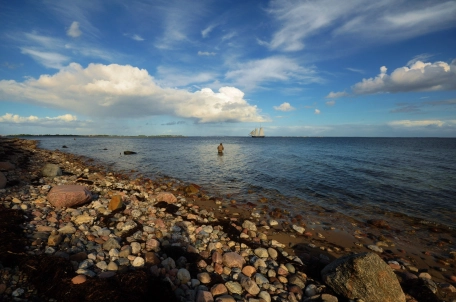
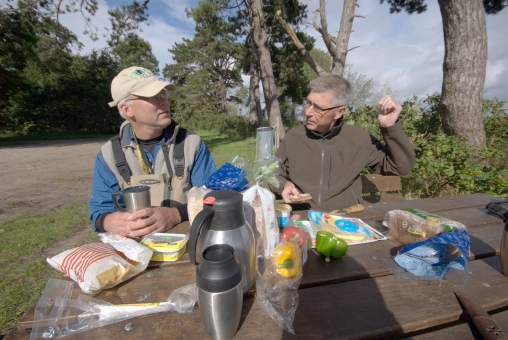
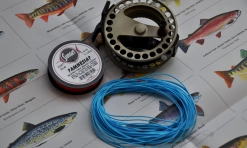
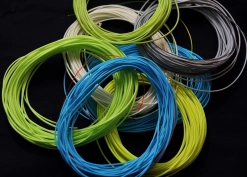
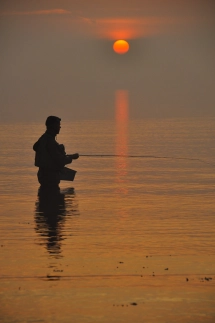
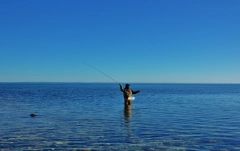
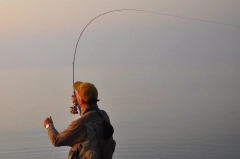
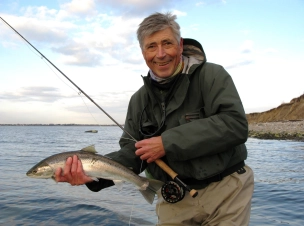
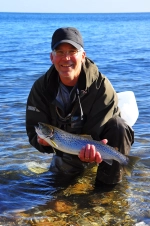
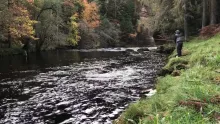
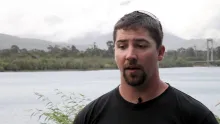
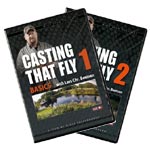
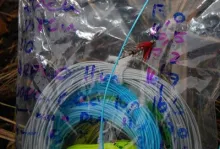
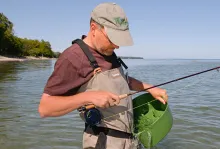
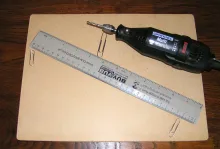

Thank Paul.! I made
Thank Paul.! I made a needle knot and finish with uv adhesive... For the moment is working ok!
Hi Mario,
.
You do
Hi Mario,
.
You don't need to apologize for your very good english. If you do a search here or on the web you will find some good instructions on, how to make a loop with the braided core of the fly line, (running line). Thats what I would do. A friend of mine uses the same running line and he just ties the running line to the loop of the shooting head, I like a cleaner connection, thats why I would go with the loop to loop connection.
Paul
Hi, after all, sorry
Hi, after all, sorry for my poor english, very nice article, in my case i have the scientific anglers shooting line and a shooting taper wet cel III, i want to know what is the best knot for join...
Again sorry for my english...
Thanks a lot...
Martin has a very go
Martin has a very good point, you wouldn't want to use this setup for fishing dry flies on a calm day. A couple of things that I do to help turn over the SH is, first I will leave a couple meter of amnesia lay in the water, before I start putting the rest in my stripping basket, this adds resistance at the end of the cast, or hold the line and just slow it down, or my favorite is to strip out just enough running line so that the SH shoots to the end, with a small `clunk´, love the feel of it.
One of the problems I had at the beginning was that the cast would run out of momentum, and just sort of fall at the end of the cast, so I played around with it a while, before I found what works for me.
Everybody,
I thin
Everybody,
I think we're splitting hairs here. Monofilament shooting line - be it 20, 25, 30 or whatever lbs is essentially the same weight, definitely the same friction and maybe has just a fraction of a fraction difference in resistance due to different stiffness.
Compared to a braided or a coated shooting line there will be an immense difference in the way any mono turns over the head and the fly in comparison, but comparing the different mono lines the difference between them has to be marginal.
I'm not saying that you can't feel a difference, but I don't think the concern about the turnover or lack of same should make you choose one over the other. If you want a difference in turnover, choose a very different shooting line - and then it's not Henning's setup anymore.
PS: To be fair I have to admit that I never fish the mono shooting lines. I personally loathe them for exactly their almost complete lack of any kind of resistance and their inability to aide the turnover of the shooting head, leader and in the end the fly. I have tried Henning's setup many times, but while the casts may be long, the presentation is not good when I use it. I also dislike handling the slippery and thin line with wet and/or cold hands.
Martin
Paul,
I disagree,
Paul,
I disagree, the running line has a lot to do with the presentation of the shooting head. Thinner rl's for lighter sh's, thicker for heavier that rules. What that means exactly depends on the capability and taste of the caster. E.g. the cast and presentation of a 18-20g shooting head with a 25lb. rl is generally spoken more difficult to control than with a 36lb. rl.. You need for the first set up a better tracking and a better power control among other things to bring a straight leader smooth on the surface. But I have only experience with mono rl's.
Cheers
Jan
Hi Simon,
You fly f
Hi Simon,
You fly fish, that is your life:-) and to answer your question, No. The running line has nothing to do with the turn over of the shooting head. Its a matter of what's comfortable for you, thinner line runs through the guides better, thicker are easier to hold on to when double hauling or setting the hook, especially when it's cold and your fingers are frozen. It's a personal choice, for me 25 lbs is a happy middle.
Paul
Hi
Great article.
Hi
Great article....one question, is there any relationship between the diameter of the amnesia running line and the shooting head to ensure proper turnover. i.e. 25lb for a #7 rod/ 9wt shooting head....so does that mean 30lb amnesia for #8 rod/10wt shooting head....or should I just get a life !!
All the best
Jan,
Thank Paul,
Jan,
Thank Paul, the author of the article. The video is both his idea and his work. I just added it to my Vimeo channel and embedded it here - with his permission of course.
Martin
Martin,
what a co
Martin,
what a coincidence and what a service. Earlier this afternoon I made a new running line on my reel and connected it as always with an Albright knot to the backing and.....I was remembering this article, but I didn't understand the explanation of the Double Turle, so I did as always my clinch knot between my Flatbeam and the shooting head. But I kept in mind to re-read the article because of the DoubleTurle - and now your video. Thanks a lot.
Cheers
Jan
Nice article. I use
Nice article. I use shooting heads myself, but i don't see them as being the only right thing on the coast. WF lines can be used in a more dynamic way when false casting and are alot more versatile. I know you can custom make shooting heads, but they are still allot less versatile.
But for variety it's nice to have. I would recommend beginners to go with coated runnig lines.
Hi Paul
Very nice
Hi Paul
Very nice article. Amnesia rules.
Tip: Put a small amount of Loon "UV Knot Sense" over the knot - to prevent the leader from hanging up.
Henning
Milan,
We have att
Milan,
We have attached a video presentation to the article, is explains the Double Turle Knot a little better. Hopefully!!
Hi Milan,
No its no
Hi Milan,
No its not so hard to tell you which knot I use, it might be a little more diffacult to explain it though:-) I use a Double Turle Knot, (also got this from Henning) you will find many instruction videos on the internet. The only difference is, is that on the internet the instructions are for attaching hooks, and the hook passes through the double loop on the last step. We make the double loop around the shooting head at the beginning, so that it doesn't need to pass through. I hope that isn't confusing.
I have also used an Albright knot, Cinch knot, Needle knot, and at the beginning I used a loop to loop connection. All worked fine, the only thing that is important to me, is that the knot is attached on to the shooting head loop, not on the end of the loop, to avoid hinging. I also have my favorite shooting head permently attached to Amnesia using a Needle knot.
Hope this helps.
Paul
Paul, Thank's for sh
Paul, Thank's for sharing!
If it is not so hard tell us which is the most simple and useful way to join Amnesia with Shooting head?
Thank's again!